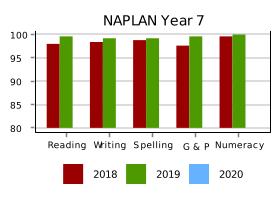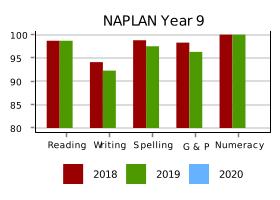
9 minute read
Learning & Teaching
Goals & Intended Outcomes Our major goal for 2020 was to develop our new Learning and Teaching Framework and Guiding Principles.
Our new Learning and Teaching framework was developed in 2020.
• Mazenod College recognises that young men have particular learning needs. Drawing on research commissioned by the International Boys School Coalition, of which the College is an active member, Dr Michael Reichart and Dr Richard Hawley has identified the core elements for boys' learning. Boys are relational learners and 'learn' their teachers - they choose to learn based as much on teachers as on subjects. • Positive and authentic relationships between staff and students, centred around "conversational learning" and founded in mutual respect, are therefore fundamental to what
Mazenod does.
• We use a Visible Learning Framework based on the research of Professor John Hattie to ensure that we are making a positive difference to maximise the learning outcomes of our students. Visible learning occurs when learning is the explicit and transparent goal. By making learning visible, teachers are more empowered to intervene in meaningful ways to enhance student achievement.
• Teachers use a strategic collection of instructional practices combined to design and deliver well-crafted lessons that explicitly teach content to all students.
Guiding principles developed in 2020:
• Mazenod's learning and teaching pedagogical framework are set upon a set of guiding principles that are followed by all teachers and in all subjects. Teachers collaborate to achieve a consistent approach to these principles: • Respectful relationships: these underpin our learning and teaching. All members of the community display courtesy and respect to one another. • Discipline: the College values and seeks to instil a discipline towards learning, with resilience and a willingness to learn as feature • High expectations: regarding behaviour, attitude, commitment and academic performance. • Equity: a set curriculum and course delivery and preparation for assessment and assessment tasks that is common across classes within the same subject. • Continuity and progression: is seamless across the year levels with evident pathways for student development in particular subject areas.
• Personalised: provision for all students including those with individual needs and those with particular gifts and talents. Enhancement pathways, special needs, modified programs and options in assessment for mainstream are all provided. • Rigorous and relevant: a robust curriculum that is thorough and challenging. The curriculum is regularly reviewed and updated with reference to State and National requirements. • Lifelong learning: a curriculum that is designed to be relevant as both preparation for future learning demands and a happy and prosperous adult life. • Explicit and scaffolded lessons and tasks: explicit step by step instructions are provided, that graduate learning, building from simple tasks to more complex tasks. Our lesson design seeks to provide a scaffold that enables students to complete tasks, together with a clear understanding of what students are learning and why they are doing so. This is further articulated in rubrics for the assessment of tasks and projects. • Regular feedback: Mazenod provides regular assessment for students in many forms including both formative and summative. Feedback is provided in a variety of forms including marking sheets, rubrics, written, audio or video teacher comments, peer feedback and selfevaluation. Student work is returned in an appropriate timeframe, typically within two weeks.
Achievements A major Learning and Teaching Achievement for 2020 was our management of lockdown and growth in approaches to flexible learning.
Mazenod focused on clarity of expectations and structures right from the outset of lockdown keeping things simple and common - while allowing flexibility within that for the early adopters and those more comfortable in the new environment; as structured as following the standard normal bell times every day and recording attendance every lesson. We leveraged existing structures such as teaching team meetings instead of faculty meetings, sharing lesson plans or outlines on common unit pages for each subject, and providing common structures to lessons within a year level team. This strategy simplified, clarified, and bought consistency to the use of our LMS for online delivery; and this in turn supported our students with certainty and daily connection.
Back at school post lockdown significant change occurred with staff wanting to maintain the positive developments such as greater collaboration and sharing. There is a greater willingness to move to increased use of online submission, and online real-time correction and feedback. A willingness to move to online parent-teacher interviews and online or blended information nights as appropriate. Online delivery has led to a greater understanding and confidence in how flipped learning can work. There is also a greater willingness to try and adapt approaches. There are higher levels of trust in the students' ability to be independent.
A shared framework was developed in 2020 to outline what Learning and Teaching at Mazenod looks like:
Mazenod teachers educate young men by cultivating strong relationships with and between their students. Cultivating strong relationships involves: • Maintaining high standards of boys' conduct promoting high expectations of work quality • Acknowledge students' academic, social, and cultural backgrounds • Encouraging them to respect differing viewpoints and to take responsibility for their own beliefs and actions
• Stimulating engagement and imagination through the sharing of interests and passions using humour, story, discussion and focussed games.
Mazenod teachers utilise our visible learning framework that involves: • Setting clear learning intentions and appropriately challenging goals for our students providing success criteria and modelling what success looks like • Employing a selection of research-based high-impact teaching strategies using evidencebased techniques to inform pedagogy • Adopting a differentiated teaching approach using data collected via a formative and summative assessment
• Using a range of regular and continuous feedback methods to enhance learning.
Mazenod teachers implement an explicit direct instructional practice that involves: • Structuring lessons with clear learning objectives and success criteria strengthening previous learning with regular review • Presenting new material in small explicit steps involving direct instructions modelling exemplar responses and guiding student practice • Using a variety of formative assessment tools to ascertain student progress, altering the lesson trajectory accordingly • Implementing a range of strategies to support mastery learning in the classroom.
Mazenod teachers incorporate a visible wellbeing approach to implement strategies into their daily classroom practice that use the SEARCH framework to foster student wellbeing in the following domains: • Strengths, Emotional Management, Attention and Awareness, Relationships, Coping, Habits and Goals.
Value Added: Learning Diversity and Student Learning Support
• The Learning Diversity Team at Mazenod is dedicated to supporting the individual learning needs of our students. With a staff of 13, the college is able to offer well-structured Literacy & Numeracy support programs that are vital in ensuring that all students are able to access their learning. In addition, the provision of the Homework Program and social activities such as Film Club provide students with varied opportunities to develop holistically. • In 2020, 215 students were identified as having adjustments made to their program and were submitted in the Nationally Consistent Collection of Data. Of these 215 students, 172 students were identified as requiring supplementary assistance or substantial assistance. These 172 students accessed Government Funding to assist with ensuring they can access their learning on the same basis as their peers.
Value Added: Enhancement Program
Mazenod College offers a comprehensive enhancement program in areas such as Humanities, Music, Mathematics, English, Robotics and Information Technology. Many students are involved at all levels in the following programs:
Enhancement Studies Year 7, Year 8 and Year 9 Enrichment Mathematics Years 7 & 8
Enhancement Mathematics Year 9, Year 10 Enhancement English Year 10, Science Year 10, Biology Year 10 Enrichment History Year 7, Year 8, Year 9 Enrichment Robotics Year 8
Enrichment Music Year 8
Enrichment Religious Education Year 9 VCE Units 1 & 2 History Year 10 Religion & Society Units 3 & 4 in Year 11 Numerous other Units 3&4 in Year 11
University Enhancement subjects in Year 12
STUDENT LEARNING OUTCOMES
The College conducted PAT tests late in 2020 to facilitate the tracking of students and provide alternative data to NAPLAN. The tests were conducted at Years 7-9 in Maths, English and Science.
Our new Data Analysis software Track One, was used to correlate the PAT data with previous years NAPLAN data as well as College Exam and other assessment data from 2020 to identify students whose progress may have been compromised by the COVID lockdown and who may benefit from our structured tutor program instigated early in 2021.
A summary of our key senior school data follows. It shows that despite the interuptions of a number of lockdowns in 2020 our students achieved results commensurate with other years.
• VCE Completion Rate 100% • Median Study Score 32 • Median ATAR Score 78.85
• Number of students scoring 99+ ATAR: 6 • Number of students scoring 95+ ATAR: 26 • Number of students scoring 90+ ATAR: 45 (24%)
• Number of students with a perfect study score of 50: 5 • Perfect 50s in: English, Geography, Further Mathematics, History Revolutions (2). • Number of study scores of 40+ (top 8%): 123, scored in 23 different subjects • Percentage of study scores of 40+: 10.9
For the sixth year in a row Mazenod had a student in Top Class auditions for Drama
Number of students from Mazenod scoring a 40+ Study Score: • Religion and Society 17 students, 1st in the State • VCE VET Engineering, 2 students, equal 1st in the State • Applied Computing: Software Development 6 students, 2nd in the State • History Revolutions, 9 students, equal 3rd in the State • Geography 6 students, equal 5th in the State
University Enhancement Studies: 1 studied Japanese at University of Melbourne
The College has a long tradition of a large number of Year 11s studying Year 12 Religion and Society in Year 11: • Religion and Society 3&4 Yr 11 Enrolment: 174, achieving 17 study scores of 40+
Enhancement studies: The College has a long tradition of Year 11 students studying a second Year 12 Unit 3&4 in Yr 11.
In 2020 53 students completed a second 3&4 study in Yr 11. They scored 18 40+ study scores; and a remarkable 46 35+ study scores. • Biology, 16 students • Applied Computing: Software Development 14 • History Revolutions 11 • Physical Education 5 • Business Management 3 • Music Performance 2
• Japanese Second Language 1 • Further Mathematics 1
MEDIAN NAPLAN RESULTS FOR YEAR 9
*
Year 9 Grammar & Punctuation
Year 9 Numeracy
Year 9 Reading
Year 9 Spelling
Year 9 Writing
* There are no NAPLAN results to report in 2020 as the Australian Government decided that due to the COVID-19 pandemic NAPLAN Assessments would not take place.
PROPORTION OF STUDENTS MEETING THE MINIMUM STANDARDS
NAPLAN TESTS 2018 2019 2018 – 2019 Changes % 2020 2019 – 2020 Changes %
YR 07 Grammar & Punctuation YR 07 Numeracy
YR 07 Reading
YR 07 Spelling
YR 07 Writing
YR 09 Grammar & Punctuation YR 09 Numeracy
YR 09 Reading
YR 09 Spelling
YR 09 Writing 97.6 99.6 2.0
99.6 100.0 0.4
98.0 99.6 1.6
98.8 99.2 0.4
98.4 99.2 0.8
98.3 96.3 -2.0
100.0 100.0 0.0
98.7 98.7 0.0
98.8 97.5 -1.3
94.1 92.3 -1.8
* There are no NAPLAN results to report in 2020 as the Australian Government decided that due to the COVID-19 pandemic NAPLAN Assessments would not take place. ** Data cannot be reported for this year as the number of students that sat the test was below 5 and the data has been suppressed for privacy reasons in accordance with the ACARA NAPLAN data reporting provisions. *** No students sat the NAPLAN tests in this year level and in one or both of the relevant years.



